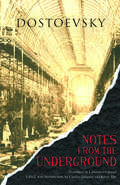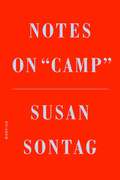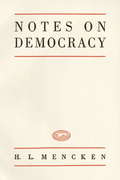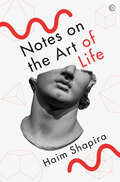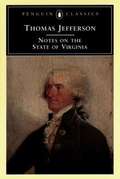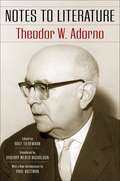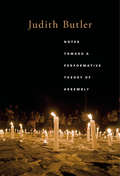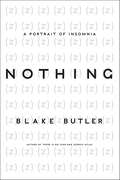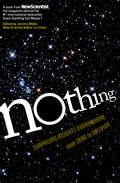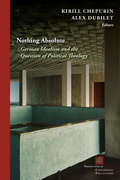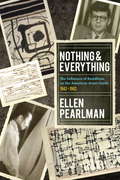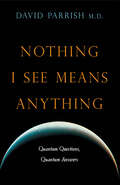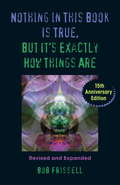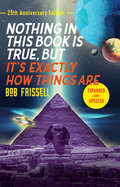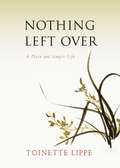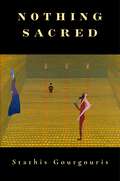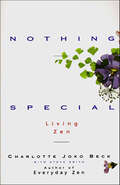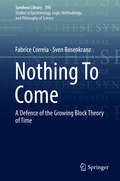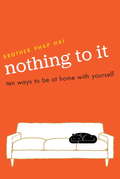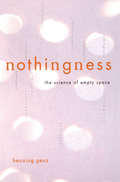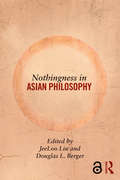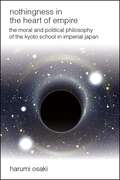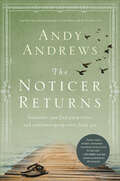- Table View
- List View
Notes from the Underground
by Kevin Aho Constance Garnett Fyodor Dostoevsky Charles GuignonDostoevsky's disturbing and groundbreaking novella appears in this new annotated edition with an Introduction by Charles Guignon and Kevin Aho. An analogue of Guignon's widely praised Introduction to his 1993 edition of "The Grand Inquisitor," the editors' Introduction places the underground man in the context of European modernity, analyzes his inner dynamics in the light of the history of Russian cultural and intellectual life, and suggests compelling reasons for our own strange affinity for this nameless man who boldly declares, "I was rude and took pleasure in being so."
Notes on "Camp" (Penguin Modern Ser.)
by Susan SontagFrom one of the greatest prose stylists of any generation, the essay that inspired the theme of the 2019 Met Gala, Camp: Notes on FashionMany things in the world have not been named; and many things, even if they have been named, have never been described. One of these is the sensibility—unmistakably modern, a variant of sophistication but hardly identical with it—that goes by the cult name of “Camp.”So begins Susan Sontag’s seminal essay “Notes on ‘Camp.’ ” Originally published in 1964 and included in her landmark debut essay collection Against Interpretation, Sontag’s notes set out to define something that even the most well-informed could describe only as “I know it when I see it.” At once grounded in a sweeping history (Louis XIV was pure Camp) and entirely provisional, Camp delights in low and high culture alike. Tiffany lamps, the androgynous beauty of Greta Garbo, King Kong (1933), and Mozart all embody the Camp sensibility for Sontag—an almost ineffable blend of artifice, extravagance, playfulness, and a deadly seriousness. At the time Sontag published her essay, Camp, as a subversion of sexual norms, had also become a private code of signification for queer communities.In nearly every genre and form—from visual art, décor, and fashion to writing, music, and film—Camp continues to be redefined today, as seen in the 2019 Met Gala that took Sontag’s essay as the basis for its theme. “Style is everything,” Sontag tells us, and as Time magazine points out, “ ‘Notes on “Camp” ’ launched a new way of thinking,” paving the way for a whole new style of cultural criticism, and describing what is, in many ways, the defining sensibility of our culture today.
Notes on Democracy
by H. L. MenckenWars for "freedom". Fundamentalists intent on banishing Darwin from the classroom. Intrusive laws. H.L. Mencken wrote "Notes on Democracy" over 80 years ago. His era, the years of World War I, Prohibition and the Scopes trial, is strikingly like today. Dissident Books reintroduces this gem of cynicism and clear-thinking to a new generation. Don't even think about voting until you read this book!
Notes on the Art of Life
by Haim ShapiraTold in a positive, no-nonsense tone, this is the ultimate tour of philosophers, artists and academics throughout the ages by philosopher Haim Shapira.Notes on the Art of Life is Haim Shapira's version of Sei Shonagon's Pillow Book – a discursive and intensely personal collection of thoughts on life; a tribute to the importance of the here and now; the value of the moment and of paying attention to it. This is a personal, cheerful and idiosyncratic tour through the thoughts and experiences of philosophers, artists and academics, finding a path through the contradictions of philosophy and the intractable challenges of life (both existential and mundane). Content includes:Exploring a wide range of philosophies, from Aristotle to Zhuang Zhu and Epicurus to SocratesTour the arts and thoughts of Abd al-Rahman III to Tolstoy, via Chekhov and GoetheExamine a myriad of essential topics, from silence and regret to happiness and other small things of absolute importance. And arriving finally at love.This book is like having a chatty and quite excitable friend guide you round a library of good books and different schools of thought. A companion who aims to comfort and reassure you about the complexities and challenges of life and of thinking about life.
Notes on the State of Virginia
by Thomas JeffersonThis American classic is the only full-length book written and published by Thomas Jefferson during his lifetime. Written in 1781, Notes on the State of Virginia was begun by Jefferson as a commentary on the resources and institutions of his home state, but the work's lasting value lies in its delineation of Jefferson's major philosophical, political, scientific, and ethical beliefs. Along with his accounts of such factual matters as North American flora and fauna, Jefferson expounds his views on slavery, education, religious freedom, representative government, and the separation of church and state. The book is the best single statement of Jefferson's principles and the best reflection of his wide-ranging tastes and talents. This edition, meticulously edited by William Peden, was originally published by the University of North Carolina Press in 1955.
Notes on the State of Virginia
by Thomas Jefferson Frank ShuffeltonJefferson's chronicle of the natural, social, and political history of Virginia is at once a scientific discourse, an attempt to define America, and a brilliant examination of the idea of freedom.
Notes to Literature (European Perspectives: A Series in Social Thought and Cultural Criticism #Vol. 2)
by Theodor W. AdornoNotes to Literature is a collection of the great social theorist Theodor W. Adorno’s essays on such writers as Mann, Bloch, Hölderlin, Siegfried Kracauer, Goethe, Benjamin, and Stefan George. It also includes his reflections on a variety of subjects, such as literary titles, the physical qualities of books, political commitment in literature, the light-hearted and the serious in art, and the use of foreign words in writing. This edition presents this classic work in full in a single volume, with a new introduction by Paul Kottman.
Notes Toward a Performative Theory of Assembly
by Judith ButlerJudith Butler elucidates the dynamics of public assembly under prevailing economic and political conditions, analyzing what they signify and how.
Notes Toward a Performative Theory of Assembly
by Judith ButlerJudith Butler elucidates the dynamics of public assembly under prevailing economic and political conditions. Understanding assemblies as plural forms of performative action, she extends her theory of performativity to show why precarity--destruction of the conditions of livability--is a galvanizing force and theme in today's highly visible protests.
Nothing: A Portrait of Insomnia
by Blake ButlerThe acclaimed author of Scorch Atlas offers a deeply candid and wildly original look at insomnia in this “superbly lyrical” memoir (Paste Magazine).Invoking scientific data, historical anecdote, Internet obsession, and figures as diverse as Andy Warhol, Gilles Deleuze, John Cage, Anton LaVey, Jorge Luis Borges, Brian Eno, and Stephen King, Butler traces the tension between sleeping and conscious life. And he reaches deep into his own experience—from disturbing waking dreams, to his father’s struggles with dementia, to his own epic 129-hour bout of insomnia—to reveal the effect of sleeplessness on his imaginative landscape.The result is an exhilarating exploration of dream and awareness, desperation and relief, consciousness and conscience—a fascinating maze-map of the borders between sleep and the waking world by one of today’s most talked-about writers.
Nothing: Surprising Insights Everywhere from Zero to Oblivion
by David Fisher Paul Davies Ian Stewart Michael Brooks David Harris Jo Marchant Linda Geddes Jonathan Knight Nigel Henbest Stephen Battersby Marcus Chown Laura Spinney Michael de Podesta NewScientist Douglas Fox Per Eklund Valerie Jamieson Rick A. Lovett Andy CoghlanThe writers behind New Scientist explore the baffling concept of nothingness from the fringes of the universe to our minds&’ inner workings. It turns out that nothing is as curious or as enlightening as nothingness itself. What is nothing? Where can it be found? The writers of the world&’s top-selling science magazine investigate—from the big bang, dark energy, and the void, to superconductors, vestigial organs, hypnosis, and the placebo effect. And they discover that understanding nothing may be the key to understanding everything: What came before the big bang—and will our universe end?How might cooling matter down almost to absolute zero help solve our energy crisis?How can someone suffer from a false diagnosis as though it were true?Does nothingness even exist if squeezing a perfect vacuum somehow creates light?Why is it unfair to accuse sloths—animals who do nothing—of being lazy?And more! Contributors Paul Davies, Jo Marchant, and Ian Stewart, along with two former editors of Nature and sixteen other leading writers and scientists, marshal up-to-the-minute research to make one of the most perplexing realms in science dazzlingly clear. Prepare to be amazed at how much more there is to nothing than you ever realized.
Nothing Absolute: German Idealism and the Question of Political Theology (Perspectives in Continental Philosophy)
by Kirill Chepurin and Alex DubiletFeaturing scholars at the forefront of contemporary political theology and the study of German Idealism, Nothing Absolute explores the intersection of these two flourishing fields. Against traditional approaches that view German Idealism as a secularizing movement, this volume revisits it as the first fundamentally philosophical articulation of the political-theological problematic in the aftermath of the Enlightenment and the advent of secularity.Nothing Absolute reclaims German Idealism as a political-theological trajectory. Across the volume’s contributions, German thought from Kant to Marx emerges as crucial for the genealogy of political theology and for the ongoing reassessment of modernity and the secular. By investigating anew such concepts as immanence, utopia, sovereignty, theodicy, the Earth, and the world, as well as the concept of political theology itself, this volume not only rethinks German Idealism and its aftermath from a political-theological perspective but also demonstrates what can be done with (or against) German Idealism using the conceptual resources of political theology today.Contributors: Joseph Albernaz, Daniel Colucciello Barber, Agata Bielik-Robson, Kirill Chepurin, S. D. Chrostowska, Saitya Brata Das, Alex Dubilet, Vincent Lloyd, Thomas Lynch, James Martel, Steven Shakespeare, Oxana Timofeeva, Daniel Whistler
Nothing and Everything - The Influence of Buddhism on the American Avant Garde
by Ellen PearlmanIn America in the late 1950s and early 60s, the world--and life itself--became a legitimate artist's tool, aligning with Zen Buddhism's emphasis on "enlightenment at any moment" and living in the now. Simultaneously and independently, parallel movements were occurring in Japan, as artists there, too, strove to break down artistic boundaries. Nothing and Everything brings these heady times into focus. Author Ellen Pearlman meticulously traces the spread of Buddhist ideas into the art world through the classes of legendary scholar D. T. Suzuki as well as those of his most famous student, composer and teacher John Cage, from whose teachings sprouted the art movement Fluxus and the "happenings" of the 1960s. Pearlman details the interaction of these American artists with the Japanese Hi Red Center and the multi-installation group Gutai. Back in New York, abstract-expressionist artists founded The Club, which held lectures on Zen and featured Japan's first abstract painter, Saburo Hasegawa. And in the literary world, Jack Kerouac and Allen Ginsburg were using Buddhism in their search for new forms and visions of their own. These multiple journeys led to startling breakthroughs in artistic and literary style--and influenced an entire generation. Filled with rare photographs and groundbreaking primary source material, Nothing and Everything is the definitive history of this pivotal time for the American arts.About the Imprint: EVOLVER EDITIONS promotes a new counterculture that recognizes humanity's visionary potential and takes tangible, pragmatic steps to realize it. EVOLVER EDITIONS explores the dynamics of personal, collective, and global change from a wide range of perspectives. EVOLVER EDITIONS is an imprint of North Atlantic Books and is produced in collaboration with Evolver, LLC.From the Trade Paperback edition.
Nothing I See Means Anything: Quantum Questions, Quantum Answers
by David ParrishA Freudian psychoanalyst draws on mysticism, philosophy, and quantum physics to shed light on the power and potential of consciousness.In Nothing I See Means Anything, Dr. David Parrish takes readers on an enlightening journey of the mind. Bringing clarity to a diverse range of complex concepts, he reveals fascinating insights into the nature of consciousness. Closing the gap between mind, matter, and cosmic intelligence, Parrish elegantly identifies the pathways to highest consciousness—a place we all are but don’t know it.
Nothing in This Book Is True, But It's Exactly How Things Are: 15th Anniversary Edition
by Bob FrissellA personal psycho-spiritual journey, this book is a revised and expanded edition of a cult classic popular among fans of metaphysical literature. Photos illustrations throughout.
Nothing in This Book Is True, But It's Exactly How Things Are, 25th Anniversary Edition: The Esoteric Meaning Of The Monuments On Mars
by Bob FrissellThe twenty-fifth anniversary edition of this underground classic explores higher consciousness, human evolution, metaphysics, sacred geometry, the secret government, and moreNothing in This Book Is True, But It’s Exactly How Things Are details from a big-picture perspective the enormous infusion of higher dimensional energy that is dramatically raising the vibratory rate of the planet and everyone on it. Bob Frissell has greatly expanded upon the previous edition by including ten completely new chapters. Frissell also gives the details of the personal transformation that we must make if we are to survive and thrive, so we can “catch the ride” into higher consciousness in a way that enables Mother Earth to reach critical mass and become “lit from within.” This is the story of nothing less than the birth of a new humanity and the cocreation of Heaven on Earth.
Nothing Left Over
by Toinette Lippe"The ideas in Nothing Left Over are seeds bursting with vitality and her book is a primer in grateful living. As you come to know her in a delightful intimacy, you come to know yourself from unsuspected perspectives."--Brother David Steindl-Rast "A magnificent piece of writing . . . "--Stephen Batchelor
Nothing Sacred
by Stathis GourgourisNothing Sacred makes a bold call for reconceptualizing the projects of humanism and democracy as creative sources of emancipatory meaning, from the immediate political sphere to the farthest reaches of planetary ways of living.Restaging Aristotle’s classic notion of the “political animal” in broad historical and geographical frames, Stathis Gourgouris explores the autopoietic capacities of human-being in society, while developing new frameworks of anticolonial humanism and radical democracy as the only worthy adversaries of neoliberal capitalism.This reconfigured anthropological horizon enables us to imagine new ways of living by learning to pursue a radical politics of autonomy and a planetary vision that upholds life-affirming coexistence and equal sharing against the fetishism of hierarchy and servitude, money and technologic, sovereignty and endless growth.Written with daring, erudition, and anarchic contestation, this book seeks the political through a poetic perspective. Nothing Sacred rejects niche thinking in the academy and engages a vast domain of reflections on the problem of human-being in today’s dismal world.
Nothing Special: Living Zen
by Charlotte Joko Beck Steve SmithThe Zen master and author of Everyday Zen shares the simple, essential wisdom of embracing the ordinary in life.Zen is life itself, nothing added. But for many of us, pursuing a spiritual path involves fantasies about our future lives—fantasies that separate us from ourselves and leave us anxious to achieve a resolution that is constantly receding just past the horizon of reality. In Nothing Special, Charlotte Joko Beck reveals how living in the knowledge that “things are always just as they are” is not the counsel of despair but an invitation to joy.Author of the Zen classic, Everyday Zen, Charlotte Joko Beck now shows readers how to awaken to daily life and discover the ideal in the everyday, finding riches in our feelings, relationships, and work. Nothing Special offers the rare and delightful experience of learning in the authentic Buddhist tradition with a wonderfully contemporary Western master.
Nothing To Come: A Defense Of The Growing Block Theory Of Time (Synthese Library #395)
by Fabrice Correia Sven RosenkranzThis monograph is a detailed study, and systematic defence, of the Growing Block Theory of time (GBT), first conceived by C.D. Broad. The book offers a coherent, logically perspicuous and ideologically lean formulation of GBT, defends it against the most notorious objections to be found in the extant philosophical literature, and shows how it can be derived from a more general theory, consistent with relativistic spacetime, on the pre-relativistic assumption of an absolute and total temporal order.The authors devise axiomatizations of GBT and its competitors which, against the backdrop of a shared quantified tense logic, significantly improves the prospects of their comparative assessment. Importantly, neither of these axiomatizations involves commitment to properties of presentness, pastness or futurity. The authors proceed to address, and defuse, a number of objections that have been marshaled against GBT, including the so-called epistemic objection according to which the theory invites skepticism about our temporal location. The challenge posed by relativistic physics is met head-on, by replacing claims about temporal variation by claims about variation across spacetime.The book aims to achieve the greatest possible rigor. The background logic is set out in detail, as are the principles governing the notions of precedence and temporal location. The authors likewise devise a novel spacetime logic suited for the articulation, and comparative assessment, of relativistic theories of time. The book comes with three technical appendices which include soundness and completeness proofs for the systems corresponding to GBT and its competitors, in both their pre-relativistic and relativistic forms. The book is primarily directed at researchers and graduate students working on the philosophy of time or temporal logic, but is of interest to metaphysicians and philosophical logicians more generally.
Nothing To It
by Brother Phap HaiIn Nothing To It, Brother Phap Hai brings his characteristic warmth and humor to explore the many different gates to transformation offered by Buddhism. A gate is a teaching, practice, or way of looking at things. Each gate is an invitation to consider a new frame of reference through which we can consider our situation, an opportunity to look at things differently. Readers who enjoyed Bhante Gunaratana's Mindfulness in Plain English will delight in this new explanation from the Australian-born Abbott of Deer Park Monastery in Escondido, California.There are fifty-eight gates explored in Nothing To It, arranged in ten traditional groups, with one chapter exploring each gate. Based on a series of talks given by Phap Hai in 2013, the book is designed to be equally valuable when read through at leisure or used as the text for a ten week self-guided course. Each chapter includes questions for reflection, additional reading suggestions on the topic, and writing exercises. The gates can be explored in order or investigated at random. Phap Hai's charming blend of ancient wisdom, Dharma scholarship, and contemporary applications will offer all who read Nothing To It a new way of seeing the extraordinary opportunities for transformation in
Nothingness: The Science of Empty Space
by Henning GenzNothingness addresses one of the most puzzling problems of physics and philosophy: Does empty space have an existence independent of the matter within it? Is "empty space" really empty, or is it an ocean seething with the creation and destruction of virtual matter? With crystal-clear prose and more than 100 cleverly rendered illustrations, physicist Henning Genz takes the reader from the metaphysical speculations of the ancient Greek philosophers, through the theories of Newton and the early experiments of his contemporaries, right up to the current theories of quantum physics and cosmology to give us the story of one of the most fundamental and puzzling areas of modern physics and philosophy.
Nothingness in Asian Philosophy
by JeeLoo Liu Douglas L. BergerA variety of crucial and still most relevant ideas about nothingness or emptiness have gained profound philosophical prominence in the history and development of a number of South and East Asian traditions—including in Buddhism, Daoism, Neo-Confucianism, Hinduism, Korean philosophy, and the Japanese Kyoto School. These traditions share the insight that in order to explain both the great mysteries and mundane facts about our experience, ideas of "nothingness" must play a primary role. This collection of essays brings together the work of twenty of the world’s prominent scholars of Hindu, Buddhist, Daoist, Neo-Confucian, Japanese and Korean thought to illuminate fascinating philosophical conceptualizations of "nothingness" in both classical and modern Asian traditions. The unique collection offers new work from accomplished scholars and provides a coherent, panoramic view of the most significant ways that "nothingness" plays crucial roles in Asian philosophy. It includes both traditional and contemporary formulations, sometimes putting Asian traditions into dialogue with one another and sometimes with classical and modern Western thought. The result is a book of immense value for students and researchers in Asian and comparative philosophy.
Nothingness in the Heart of Empire: The Moral and Political Philosophy of the Kyoto School in Imperial Japan
by Harumi OsakiIn the field of philosophy, the common view of philosophy as an essentially Western discipline persists even today, while non-Western philosophy tends to be undervalued and not investigated seriously. In the field of Japanese studies, in turn, research on Japanese philosophy tends to be reduced to a matter of projecting existing stereotypes of alleged Japanese cultural uniqueness through the reading of texts. In Nothingness in the Heart of Empire, Harumi Osaki resists both these tendencies. She closely interprets the wartime discourses of the Kyoto School, a group of modern Japanese philosophers who drew upon East Asian traditions as well as Western philosophy. Her book lucidly delves into the non-Western forms of rationality articulated in such discourses, and reveals the problems inherent in them as the result of these philosophers' engagements in Japan's wartime situation, without cloaking these problems under the pretense of "Japanese cultural uniqueness." In addition, in a manner reminiscent of the controversy surrounding Martin Heidegger's involvement with Nazi Germany, the book elucidates the political implications of the morality upheld by the Kyoto School and its underlying metaphysics. As such, this book urges dialogue beyond the divide between Western and non-Western philosophies, and beyond the separation between "lofty" philosophy and "common" politics.
The Noticer Returns: Sometimes You Find Perspective, And Sometimes Perspective Finds You
by Andy AndrewsFrom New York Times bestselling author Andy Andrews comes the sequel to The Noticer! In the quiet coastal town of Fairhope, Alabama, a mysterious old man named Jones has set up shop to do the one thing he knows best—&“noticing&” the little things that make a big difference in people&’s lives. Perspective is a powerful thing.Through a chance encounter at a local bookstore, Andy Andrews is reunited with the man who changed everything for him— Jones, also known as &“The Noticer.&”Jones uses his unique talent of noticing the little things that make a big difference. And these little things grant the people of Fairhope, Alabama, a life-changing gift—perspective.Through the lens of a parenting class at the Grand Hotel in Point Clear, Jones guides a seemingly random group to ask specific questions inspired by his curious advice: &“You can&’t believe everything you think.&” The questions lead to answers for which people have been searching for centuries:How do we begin to change the culture in which we live?What is the key to creating a life of success and value?What if what we think is the end…is only the beginning?Along the way families are united and financial opportunities created, leaving the residents with powerfully simple solutions to the everyday problems we all face. What starts as a story of one person's everyday reality unfolds into the extraordinary principles available to anyone seeking to change their life.Jones&’ adventures continue in book three of The Noticer series: Just Jones.
